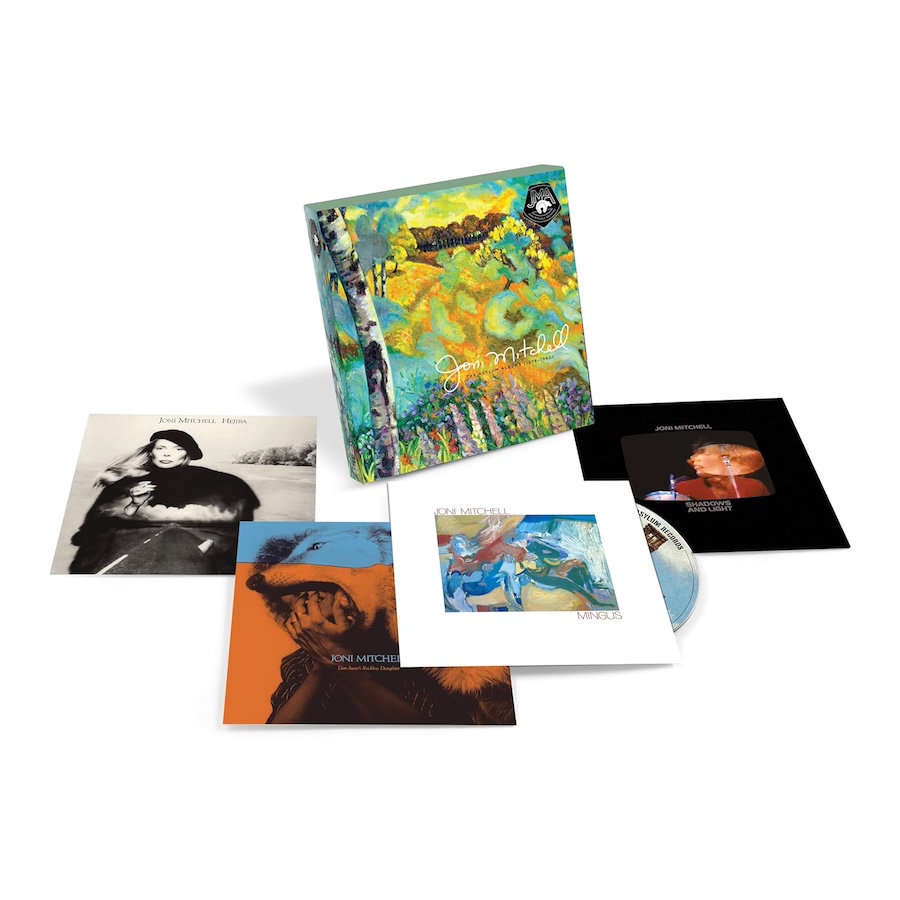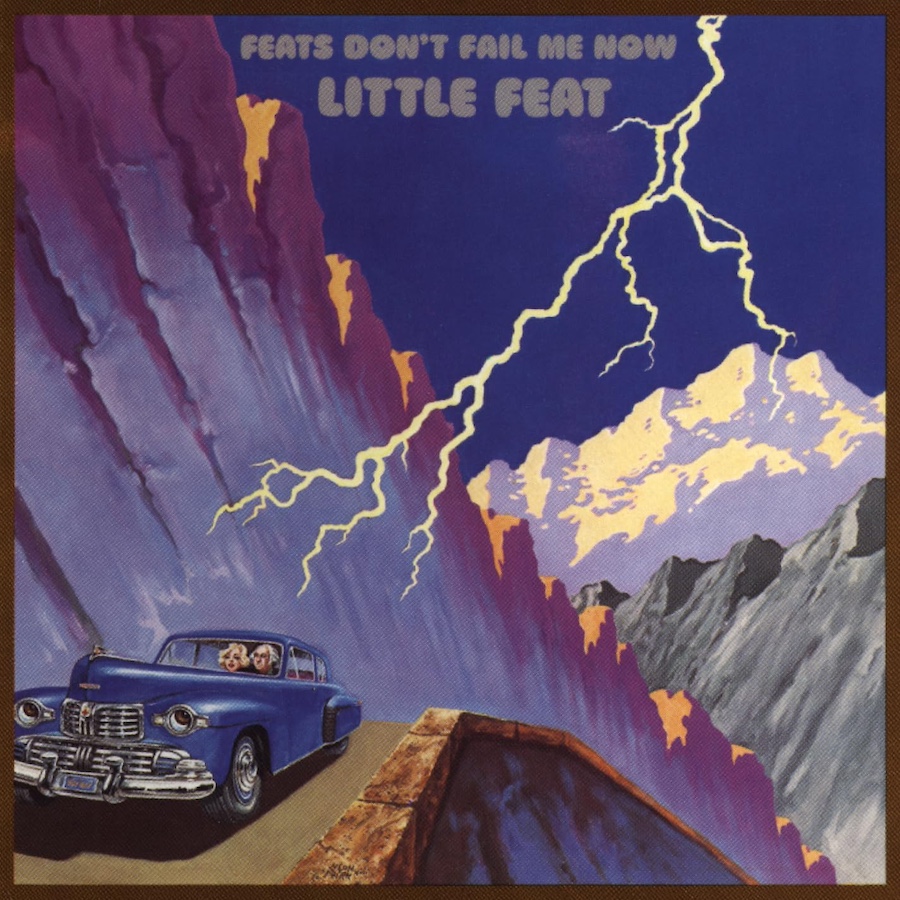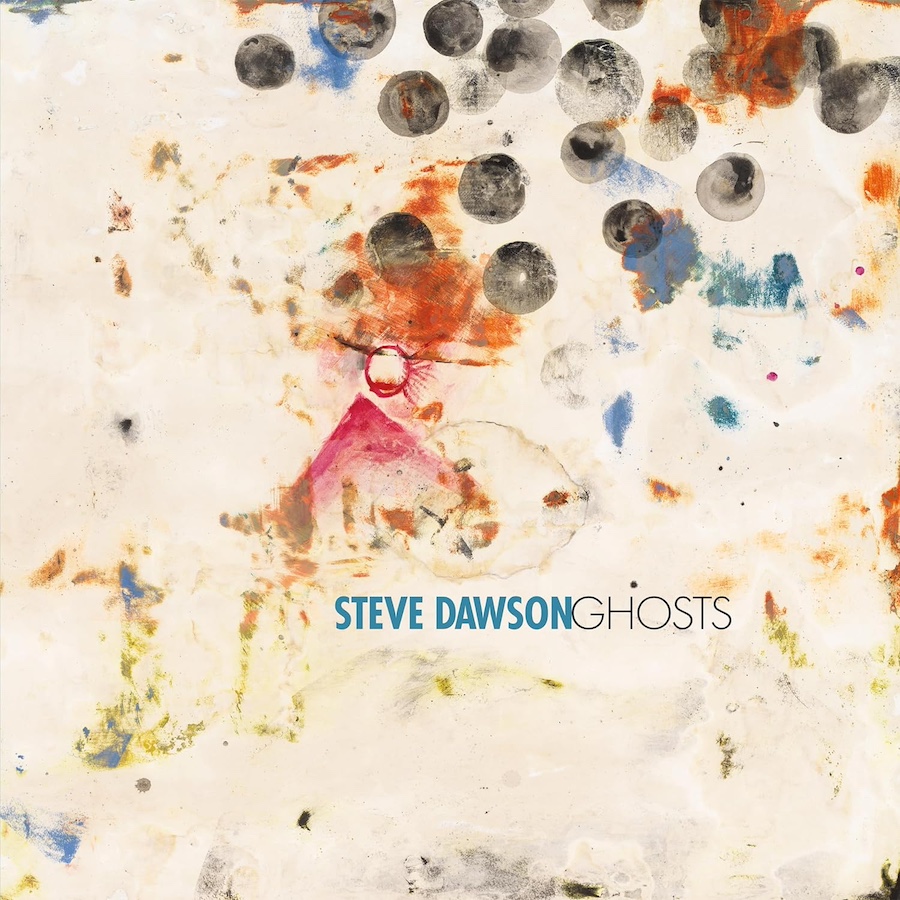A Box Set Collects Four Notable Joni Mitchell Albums
The third in a series of box sets of Joni Mitchell’s studio LPs includes four trailblazing LPs: Hejira, Don Juan’s Reckless Daughter, Mingus, and Shadows and Light. Called The Asylum Albums (1976–1980), the box comes with a new appreciative essay by Meryl Streep. Like the earlier The Reprise Albums (1968–1971) and The Asylum Albums (1972–1975), it features remastered audio and reproductions of the original LP covers (complete with lyrics, though you’ll probably need a magnifying glass to read them). There are, however, no bonus tracks; those are reserved for a must-hear separate series called Joni Mitchell Archivesthat has so far produced three volumes: The Early Years (1963–1967), The Reprise Years (1968–1971), and The Asylum Years (1972–1975).
The Asylum Albums (1976–1980) covers a particularly adventurous chapter of Mitchell’s story. She had already flirted with jazz on 1974’s Court and Spark and 1975’s The Hissing of Summer Lawns. She continued down that road with 1976’s Hejira, the oldest album in the new box, which prominently features the late jazz bassist Jaco Pastorius on four of its nine tracks and includes contributions from such other jazz-leaning artists as saxophonist Tom Scott and guitarist Larry Carlton. The best cut is the rhythmic lead-off number, “Coyote,” which artfully limns a one-night stand. But the other songs – most of which address romantic liaisons and/or life on the road – are uniformly first-rate.
While Mitchell has one foot in the jazz world on Hejira and its two predecessors, she’s all-in with that genre on 1977’s Don Juan’s Reckless Daughter, a somewhat less successful album, commercially and critically, that nevertheless merits attention. It includes such off-the-beaten-path excursions as “The Tenth World,” seven minutes of Latin percussion that sound like nothing else in Mitchell’s catalog, and the 16-minute “Paprika Plains,” which features improvisational piano and a full orchestra.

Her next album consists largely of collaborations with the late, great Charles Mingus. Called Mingus, this 1979 release opens with Mitchell and others singing “Happy Birthday” to the jazz bassist and composer. It includes three new numbers for which he wrote the music and she wrote the lyrics; a new version of Mingus’s famous “Goodbye Pork Pie Hat” for which Mitchell added words; a couple of her own new songs; and several spoken interludes labeled “Raps.” Mingus, who died while the album was being made, doesn’t play on it, but it features several jazz luminaries, among them Pastorius, saxophonist Wayne Shorter, and pianist Herbie Hancock.
Also in the box is the two-CD Shadows and Light, a 1980 live album. While Miles of Aisles, the concert record in the previous box in this series, focused on Mitchell’s early work, this set sticks mostly to material from Hejira, Mingus, and Don Juan’s Reckless Daughter, though it does make room for a few earlier standouts, such as “Free Man in Paris” and “Woodstock.” Again, Mitchell calls on jazz greats for backup, including Pastorius, guitarist Pat Metheny, saxophonist Michael Brecker, and keyboardist Lyle Mays. And she sounds like a jazz singer throughout with one notable exception: an out-of-character but enjoyable rendition of “Why Do Fools Fall in Love?,” the 1956 doo-wop hit by Frankie Lymon & the Teenagers, for which she is joined by the vocal group the Persuasions.
That performance (like virtually everything on the four albums in this box) offers a reminder that Mitchell has long refused to be pigeonholed or to take the safe road. She undoubtedly could have had a great career churning out more of the wonderful acoustic folk that filled her earliest albums. Instead, she followed her muse in multiple directions, taking one chance after another, and most of the time, succeeding brilliantly.
Also Noteworthy

Little Feat, Feats Don’t Fail Me Now (Deluxe Edition). First released in 1974, this fourth Little Feat album arguably ranks just a notch below the earlier Dixie Chicken and Sailin’ Shoes, but that doesn’t mean it isn’t loaded with fine examples of the group’s boundary-bending R&B-flavored Southern rock. The last Little Feat LP where cofounder and original lead vocalist Lowell George plays a big role, it is also the first to feature major contributions from the group’s other members. One highlight is keyboardist Bill Payne’s funky “Oh Atlanta.” Another is George’s “Spanish Moon,” a brassy, jazzy gem that sounds like something the late New Orleans R&B master Allen Toussaint – an apparent major influence – might have created.
Like Dixie Chicken and Sailin’ Shoes, this album is now available in an expanded, multi-disc edition. Its first CD presents a remaster of the original record while a second adds seven alternate versions, four outtakes, and the single edit of “Spanish Moon.” A third and final CD delivers a consistently entertaining nearly hour-long 1975 Paris concert that features several numbers from Feats Don’t Fail Me Now plus Toussaint’s “On Your Way Down” and George’s best-known song, “Willin’,” which first appeared on Sailin’ Shoes.

David Serby, Low Hanging Stars. Southern California–based singer/songwriter David Serby released five albums between 2006 and 2013 but nothing after that until now. He makes a welcome return to the studio on Low Hanging Stars, which should appeal to fans of acts like New Riders of the Purple Sage, Texas Tornados, and Commander Cody. The album contains 10 upbeat and mid-tempo self-penned numbers that draw on country, Tex-Mex, and early rock.
Serby handles lead vocals and plays acoustic guitar throughout the set, garnering support from musicians who play organ, piano, electric guitar, bass, drums, and accordion. Highlights include the lilting “Another Chance to Dream”; “The Jukebox Is Broken,” a toe-tapper about a bar with a non-working music player; and “I Bought the Ring,” a lively country rocker with wordplay about a wedding ring that led a couple into what felt like a boxing ring.

Steve Dawson, Ghosts. This sixth solo album from Chicago-based Steve Dawson, who also records with the alt-country group Dolly Varden, recalls 1970s Laurel Canyon acts like J.D. Souther, Jackson Browne, Neil Young, and Rick Nelson & the Stone Canyon Band. Recorded live in the studio, its 10 original numbers employ a backup crew that adds instruments such as pedal steel, accordion, sax, and trumpet. Dawson’s wife and Dolly Varden bandmate, Diane Christiansen, contributes harmony vocals on several tracks.
Dawson’s excellent last LP, 2021’s At the Bottom of a Canyon in the Branches of a Tree, found him grappling with the then-recent deaths of his wife’s parents as well as the earlier loss of his mother and abandonment by his father. He’s clearly continuing to grapple on the introspective folk- and Americana-based Ghosts.
In “Oh, California,” for example, he confesses that “I’m still digging out from under this mess” and, in “Sooner Than Expected,” he sings, “I still get the stab in center of my chest, loss by loss year by year.” “Leadville” limns a difficult childhood while “A Mile South of Town” includes a line about being born “the happy little son of an angry old man.”
Don’t conclude that it’s all doom and gloom, however. Not only is the music consistently melodic and soothing but Dawson’s lyrics suggest that he’s rising above his demons. As he sings on “Time to Let Some Light In,” the lead-off track, “I’ve done enough crying.” There’s also a number whose title proclaims, “I Am Glad to Be Alive.”
Jeff Burger’s website, byjeffburger.com, contains five decades’ worth of music reviews, interviews, and commentary. His books include Dylan on Dylan: Interviews and Encounters, Lennon on Lennon: Conversations with John Lennon, Leonard Cohen on Leonard Cohen: Interviews and Encounters, and Springsteen on Springsteen: Interviews, Speeches, and Encounters.



